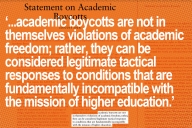You have /5 articles left.
Sign up for a free account or log in.

GoKAR! recruitment flier
University of Texas at Austin
Recruiting for a research study on the effectiveness of antiracism training for white children is on hold at the University of Texas at Austin. This follows a complaint to the Department of Education’s Office for Civil Rights that the project is racially discriminatory, among other criticism.
The university is now reviewing the study. Numerous professors are asking the university to allow the research to proceed during the internal and external reviews, arguing that UT Austin’s institutional review board previously approved the project, as did peer reviewers during a competitive internal funding process.
These professors warn that halting research due to outside complaints threatens the integrity of the study at hand and, more generally, chills free inquiry into timely subjects such as antiracism.
UT Austin “leadership’s decision to pause elements of the study based on the mere filing of a complaint, and before any assessment of whether the complaint poses a credible claim, compromises the integrity of the research and the academic freedom to conduct research and draw conclusions rooted in evidence,” 18 UT Austin education professors said this week in a letter to President Jay Hartzell and Provost Sharon Wood.
The study “is time-sensitive, as it requires rolling out of materials and assessments according to a very strict schedule that has already been compromised,” the letter continues. “The leadership’s decision to pause any aspects of the study has the effect of legitimizing actions that, however unfounded, seek to suppress scholarly pursuit of truth and the advancement of scientific knowledge.”
GoKAR!, or Kids Against Racism, recently began recruiting up to 200 pairs of children and their caregivers, advertising opportunities to “engage in dialogue about anti-Black racism with their preschool-aged children at home.” Study participants, who will watch professional children’s videos and receive discussion guides about these topics, must identify as white. Children must be 4 to 5 years old and not yet in kindergarten.
The purpose of the study, according to a recruitment flier, is to explore “overall engagement with the GoKAR! program, as well as the potential for the program to reduce bias and increase awareness of racism.” Total time required is up to 7.5 hours. Compensation is a $25 gift card and an additional $20 gift card for completing an optional parent interview.
The study hit a speed bump after Mark Perry, a professor emeritus of economics at the University of Michigan and a scholar at the American Enterprise Institute, filed a complaint with the Dallas OCR office alleging violations of Title VI of the Civil Rights Act of 1964, which prohibits discrimination on the basis of race.
UT Austin “blatantly violates Title VI by illegally engaging in racial discrimination on the basis of skin color by promoting, sponsoring, offering, and marketing a discriminatory program that engages in racial segregation,” Perry wrote to the OCR. “In violation of Title VI, the University’s GoKAR! Program operates illegally and exclusively for caregivers and their 4-5 year old children who both must identify as white and illegally excludes and discriminates against and excludes non-white caregivers and their 4-5 year old children on the basis of their race and skin color.”
Several days after Perry filed his complaint, UT Austin posted a notice about GoKAR! saying that it was reviewing a complaint filed with the OCR. “Research projects conducted by over 6,000 university researchers cover a wide range of topics with a diversity of perspectives and approaches,” reflecting the university’s “commitment to freedom of thought, speech and expression, along with long-standing principles of academic freedom,” the notice says. “Because we also expect all research projects to comply with the law and university polices, the university is conducting a legal compliance review of the complaint before this study is launched.”
That same day, researchers leading the study received an email from Wood, the provost, asking them to “pause delivery of any educational program materials to the volunteers who have agreed to participate in this project” pending a legal review. Three days later, on Sunday, the researchers received another email from the university, limiting the scope of the pause to recruitment and enrollment of participants.
University officials referred questions about the project to this notice.
GoKAR!’s three principal investigators, Huriya Jabbar, Kate Pounders and Jessica Toste, all tenured professors, did not respond to requests for comment Tuesday.
Victor Saenz, chair of educational leadership and policy at UT Austin and the first of the 18 education professors to sign the letter of concern, said via email that he wanted “to clarify that we’ve been in constant communication with all levels of UT leadership throughout this review process.” The university is “working expeditiously to help resolve this matter to ensure our faculty are being fully supported.”
Deep Concerns
Saenz’s letter to Wood and Hartzell tells something of a different story: “We are deeply concerned by the request to pause any aspect of the research. The university’s actions raise serious concerns regarding the differential treatment of research based on subject matter and viewpoint. In our experience, and in consulting with individuals who have extensive experience interacting with the [OCR] and/or expertise in academic freedom and civil rights, this is an atypical and unprecedented response from a university.”
The faculty letter further explains that the GoKAR! study was funded through UT Austin’s office of the vice president for research in 2020 with an initial grant of $100,000, following a review by two university professors. The criterion that participants be white “is important because existing literature indicates opinions, biases and the effectiveness of interventions vary across racial groups,” the letter says. “The study’s sampling of one racial group ensures that its findings are more robust. Moreover, the study’s results will provide needed contributions to the education field where research-informed interventions to reduce racism among white children are lacking.”
The letter also quotes National Institutes of Health guidance related to civil rights protections that “research protocols that target or exclude certain populations are warranted where nondiscriminatory justifications establish that such criteria are appropriate with respect to the health of the subjects, the scientific study design, or the purpose of the research. It is not anticipated that civil rights protections should alter the fundamental manner in which research projects are designed, conducted or funded.”
Referencing several critical blog posts and news articles about the study, some of which suggest that the project amounts to training, not research, the faculty letter says that “to succumb to political coercion, especially as it relates to scholarship that confronts anti-Black racism, white supremacy, and any other forms of oppression, compromises the central function of a public university. The university’s actions send a message that risks censoring and chilling professor speech based on viewpoint, running afoul of central tenets of the First Amendment.”
Jonathan Friedman, director of free expression and education for PEN America, which recently released a study on what it calls “educational gag orders” regarding critical race theory, said the UT Austin case is related to ongoing legislative efforts to limit teaching and training about race, and a “nervousness setting in around research or teaching that relates to race, antiracism or CRT on public university campuses.”
Friedman said that UT Austin’s response to the controversy thus far does seem “unusual,” and that it’s “concerning that public complaints of this nature could effectively derail approved academic research.”
Beyond the education faculty, UT Austin’s faculty Committee of Counsel on Academic Freedom and Responsibility reached out to administrators to this week to ask them to lift the pause on any aspect of the project, and to say the committee was launching its own investigation of alleged violations of the three PIs’ academic freedom.
The case “sets a dangerous precedent for interruption or termination of scholarly research by the mere filing of claims that may prove baseless,” that letter says. “Furthermore, the fact that the research project in question was peer-reviewed, subjected to IRB scrutiny, and approved and funded by the [vice provost for research]’s office, indicates that it met all of the relevant criteria for the inclusion and exclusion of human subjects in research.”
Andrea Gore, chair of the committee and Vacek Chair in Pharmacology, said Tuesday that she’d received a response from Wood, the provost, affirming the university’s commitment to academic freedom while explaining that UT Austin needs to explore alleged violations of civil rights. Gore said she appreciated the communication but that the committee remains concerned that a complaint, “which is very far away from proving that there’s any sort of violation of Title VI is shutting down research, because that really sets a dangerous precedent for any group, whether legitimate or not, to be able to shut research down. That just simply shouldn’t happen. We’re puzzled by why this investigation can’t happen while the research is continuing to be performed.”









